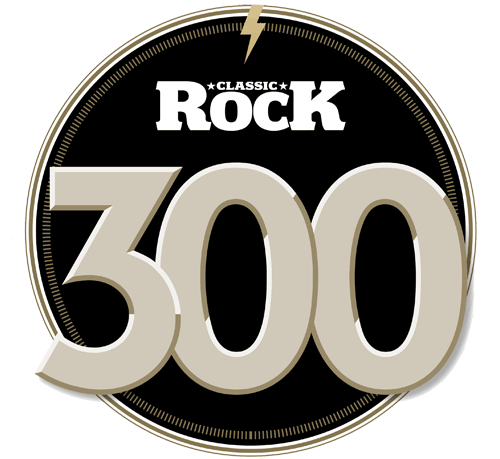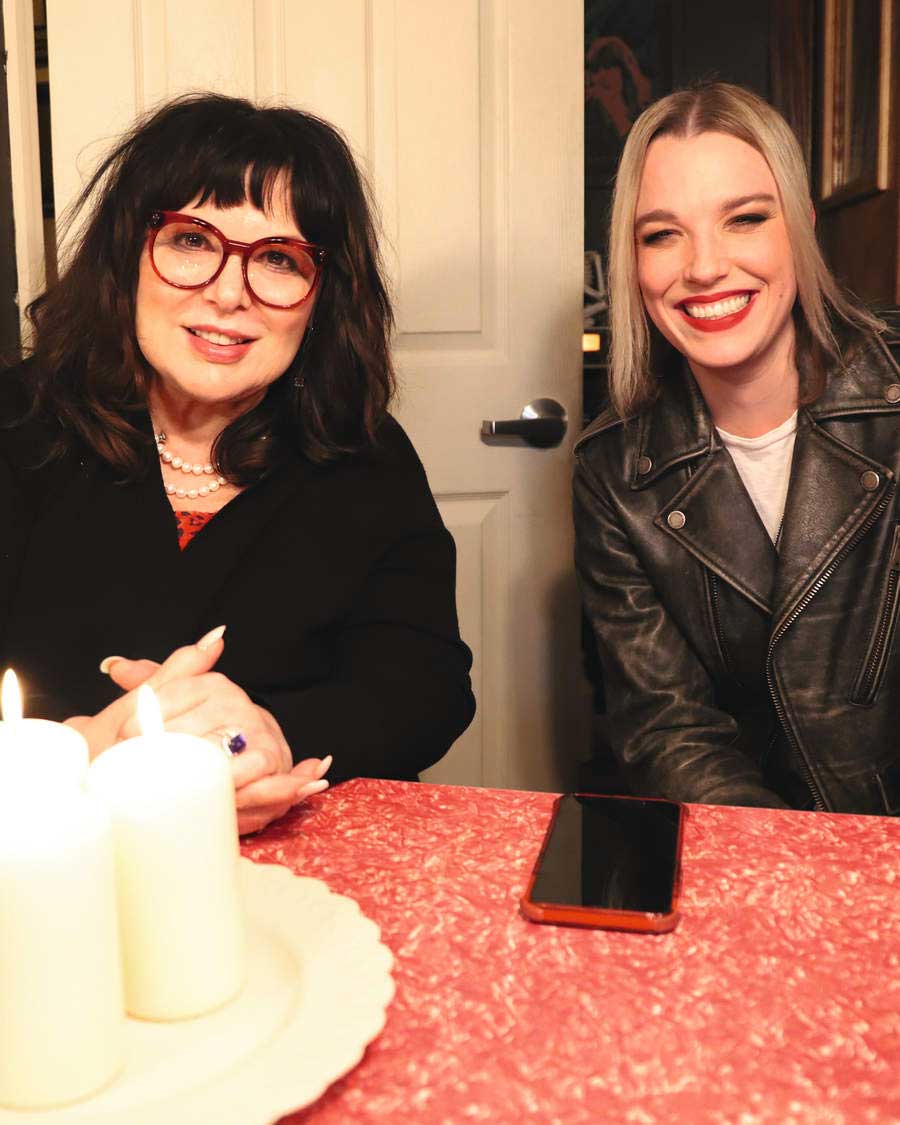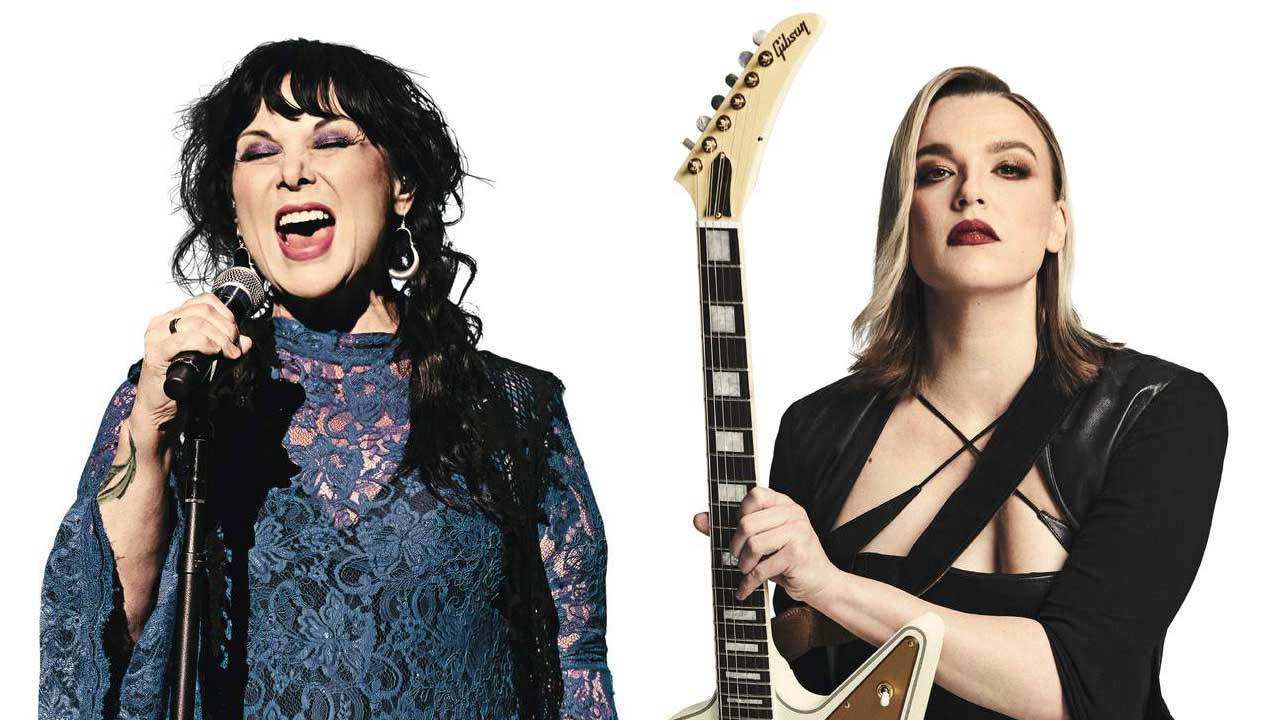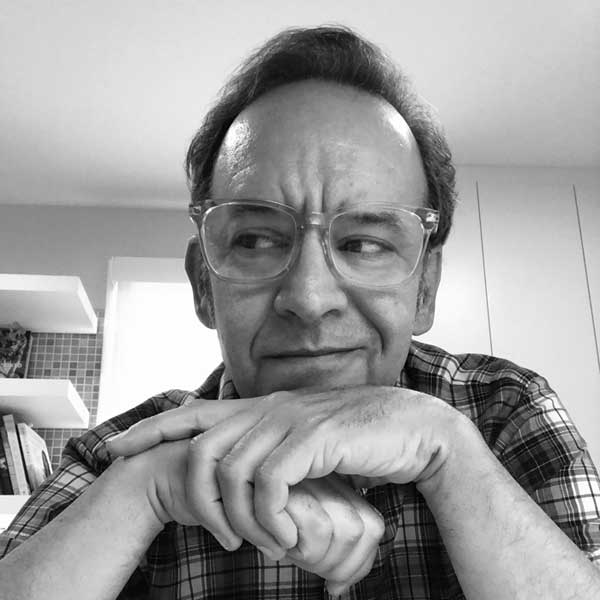
This interview was conducted to mark the 300th issue of Classic Rock magazine, which launched in 1998. The magazine is available to purchase online, and also features interviews with Jimmy Page, Ozzy Osbourne, Gene Simmons, Alice Cooper, Geddy Lee, Slash and many more.
Lzzy Hale is smiling from ear to ear, looking like she’s 15 again. It’s understandable; the Halestorm singer-guitarist has just met her idol, Heart vocalist Ann Wilson, for the first time.
We’re in The Smoakstack, one of the many studios that has transformed Nashville neighbourhood Berryhill into the next Music Row. Wilson is here recording a new solo album, and from the control room you can hear snippets of a playback with her unmistakable powerhouse voice.
For Classic Rock’s interview, the studio has set up what looks like a little staging set – a 1950s red formica table and chairs, with candles and flowers. As the two women settle into conversation, there are many knowing nods and bursts of shared laughter. By the end of the allotted hour it feels like a new friendship has been forged.
And although age-wise they’re separated by a few decades – Hale is 38, Wilson 71 – they’re part of a continuum of remarkable artists who have continued to overturn outdated notions about rock music. More than that, to use Wilson’s phrase, they’ve both answered “a calling”.

You’re both in bands with your siblings. What’s the best and worst thing about that?
Ann: For me the best part was and is always that we have a shorthand. We know what each other is feeling without having to say it. I can look across the stage and if she’s [sister Nancy] freaking out I can go over and give her some vibe. Or vice versa.
Being women coming up through a business through the decades in a male-dominated industry – not so much any more – that was a real strong means of support. The dark side would be that you were kids together and you know how to push each other’s buttons [laughs]. And so things can get real icy. That’s hard when you’re trying to do a tour.
Lzzy: My little brother [Arejay Hale] is my drummer. We’ve been doing this since 1997, when we were teenagers. And everything we’ve been through together since then, it was always him and me against the world. We had been having trouble finding other members, and it was just a rotating door of kids in and out. I remember saying: “Bro, are we crazy for even doing this?”
Ann: [Laughing] We said the same. But you’re driven. It’s a calling.
Lzzy: He said: “Yeah, we’re crazy, but… what else are we going to do?”
Ann: It’s an interesting dichotomy. Sometimes it’s the best thing in the world, and sometimes you’re just like, I’m a grown up, I don’t want to be in this family.
Ann, there has been some talk recently that you and your sister are feuding.
Ann: We’re not. It’s a myth. Nancy and I are okay with each other. We just have different ideas for what Heart should be, and we haven’t figured out a compromise yet. Fifty years on, I still want it to break barriers and rules, and she’s more satisfied to ride the LA imaging thing and just do legacy stuff. So that’s a real split between us. Things like this will happen, though, but then they’ll get better, and we’ll love each other more.
Ann, you came into 1998 not with Heart but with The Lovemongers. Then, while Nancy took a break, the Ann Wilson Band. How did that shape the next chapters of your musical life?
Ann: We had come through the eighties and early nineties, which was Heart’s most commercially successful time. It was the MTV era, where you’d spend half a million bucks to make a video that would sell the record. It was an incredibly traumatic, stressful time. So by 1998 I’d gone back to Seattle, I had two kids, ages seven and newborn, and I felt like: “God, I’m just going to do whatever I want. I don’t have to play Magic Man any more” [laughs].
It was a reaction time. I totally shed the skin of Ann Wilson in Heart, and just went: “Fuck this, this is so not me.” Also, I was offended by the way Nancy was being presented. Sure, she agreed to it, but it was offensive to me that she was always trotted out front as this little cheesecake thing. I just felt really alienated. So I stepped out of it.
For you, Lzzy, around 1998 you had discovered Heart through their live album The Road Home. You’ve said it “set the tone” for what you do.
Lzzy: [To Ann] First and foremost, I would not be the singer that I am without you and without what you’ve done. There’s an otherworldly thing inside you. There’s a way that you flip yourself inside out and reveal your soul to someone. You’re queen of that. Back then, I was just digging for anything that I could grasp on to where I could see myself.
My dad introduced me to Deep Purple, Ronnie James Dio and Van Halen. My mom, God bless her, said: “Well, if you’re going to be into all of that stuff, you’ve got to know that women can do this too!” So she got me a bunch of CDs and one of them was The Road Home. I wore it out. In the Pennsylvania scene, everybody wanted to be Jewel; everything was all very soft and there was no passion and anger.
[To Ann] So when I heard you sing on that live album, it made that bridge to what I wanted to sound like and who I wanted to be just a little bit shorter. It really helped me figure out my stage presence as well. Really, you put me through rock’n’roll school [laughs].
Ann: Oh, I’m honoured.
Lzzy: I also want to thank you for not giving up when it got tough, because I know the roller-coaster ride of what you went through. I’ve gone through my own version of it, and it doesn’t even touch what you guys had to do – the doors you had to kick down and the glass that you had to break to be here. The fact that I’m listening to you talk about making sure that Heart still has that edge and breaking barriers, and you still have that mentality? That’s life goals for me.
Ann: It goes back to the whole thing of it being a calling, like you said about your brother: “We may be crazy, but what else are we going to do?” People ask me: “Are you going to retire soon?” And I go: “No, because I don’t know what that means.” I’ve been doing this since I was fourteen.
You’re both very powerful singers. Can you talk about how you connect with an audience?
Ann: I don’t think about it when I’m up there. I use in-ear monitors, because they give the feeling of being in a studio. You can hear every little breath and really control the way you’re relating with an audience. The powerful stuff, that’s more physical. You want to throw your voice out to the back of the place, up to where people are breaking bottles in the hall [laughs].
Lzzy: As far as the dynamic with the audience, I think the bigness is intimacy. It’s amazing how you can look at somebody eight to ten rows in and they’ll know you’re looking at them. I found the reach from the front to back in an arena by picking people out and having that individual relationship, because there’ll be a weird ripple effect.
Speaking of that connection, I’ve watched Heart’s performance of Stairway To Heaven at the Kennedy Center in 2012 hundreds of times, and it always makes me cry. What stands out most for you about playing to Led Zeppelin and that star-studded audience?
Ann: The five minutes before we went out on stage, Nancy and I looked at each other and we almost did a psych-out. We went: “Fuck, do you know who’s out there?” At that moment, I had to use a meditation technique where you envision that you have a bowl of water and you’re going to walk across the room and not spill any. Just focus on something simple and positive, which we both did.
Ann, you got sober in 2009. Lzzy, you’ve started going to therapy in the past few years. Can you both talk about how you stay grounded in such a stressful business?
Lzzy: There’s a roller-coaster ride that goes with me. I have extreme highs and extreme lows. As many people do. It’s not just because of what I do for a career. We’re all in this together. I think it’s important to recognise those things, and when you need to ask for help. Understanding that you’re the one in charge of your own destiny.
Therapy has helped. Music has helped. During the last two years I’ve had the opportunity to look in the mirror and get to know the person. Not just Lzzy Hale who’s on stage, but the Elizabeth Hale in her pyjamas on the couch. I haven’t seen her in a while [laughs].
Ann: [Laughs] Wasn’t that something? It’s like: “Whoa, I guess I’ve got to feed her.”
Lzzy: Rediscovering the importance of why we’re in this. That’s important. Like we were talking about earlier. The calling that you’re meant to be doing this. This magic, this power, this intangible thing cannot be filled with anything else. That happy place that we’re in on stage. So it’s easy to get into vices. It’s easy to get into anything that will take you on a mini-vacation away from those feelings. It’s important to realise that those things can’t replace the happiness you can build inside of yourself.
Ann: For me, I just came to the end of an era in my life of just blowing it all the time. Going on stage feeling hungover because last night the band partied and I joined in. All that kind of stuff. I just came to the end of it. Especially because I had kids. I wasn’t going to be high around the babies.
I think it’s helped in some ways to be not partying all the time. But – and this is going to sound really old-fashioned Hemingway era – in other ways, to alter your senses is a way to let go of the mundane. Especially when you’re writing or something like that. But I don’t want to live by that either.

Another unexpected recent development has been the return of vinyl.
Lzzy: I think the act of putting on an album is profound. Instead of just putting songs on a playlist. Listening to the album as the artist meant it to be is one of the most enjoyable pastimes for me.
Ann: And you don’t have to be a golden-years person to feel and hear the difference – it’s more present, warm, more thrilling. What in rock music is exciting to you right now?
Lzzy: There’s a lot of danger going on right now. A lot of young artists risking things, who don’t feel the need to grovel at the feet of a label any more. That’s exciting. Artists are taking the reins. I’m talking about middle school to high school age. They don’t care what anybody thinks about them. That’s exciting. Also, I feel like there’s a resurgence of appreciation for guitar-driven rock again.
Any final words?
Ann: Thank you for the good conversation.
Lzzy: Absolutely. And Ann, I can’t thank you enough for everything that you’ve meant to me over the course of my career and my life. You enabled me to be my best self and to follow something I thought was absolutely impossible, and it proved to me that nothing is impossible.
Ann: You’re welcome. Wow. I don’t know what else to say [laughs]. It’s so big and far-reaching. I’m just really glad to hear that.
Lzzy: And happy three-hundredth issue to Classic Rock. We love you!
Ann Wilson's album Fierce Bliss is out now. Halestorm's Back From The Dead is released May 6, and Lzzy Hale appears on the cover of the current issue of Metal Hammer.

